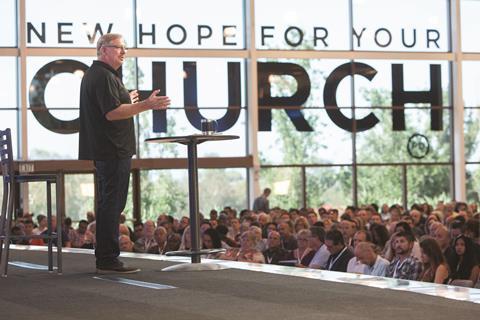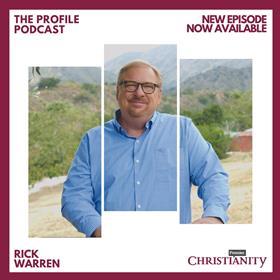The pastor and best-selling author tells Megan Cornwell how he changed his mind on women in ministry, why he’s ashamed of American evangelicals and what convinced him that gay relationships are ‘not God’s best’
Rick Warren needs few introductions. The author of The Purpose Driven Life (Zondervan) – which according to publishers has sold more than 50 million copies worldwide – is akin to evangelical aristocracy.
English Baptist preacher Charles Spurgeon led Warren’s great-great-grandfather to Christ and Warren grasped the evangelistic baton with gusto in the 1970s as a teenager in the Jesus Movement that swept America. He spent years “preaching up a storm” at youth revivals on the West Coast, only to be noticed by Billy Graham, who took the “long-haired skinny young man with wire-rimmed glasses” under his wing, becoming his mentor for the next 50 years.
Saddleback, the Californian megachurch Warren went on to establish with his wife, Kay, in 1980, has since grown to be one of America’s largest – with a weekly congregation of roughly 30,000.
What we’re going through right now is a shifting of the Church
Once named by Time magazine as among the world’s most influential people, the 69-year-old has rubbed shoulders with celebrities, dined with presidents and had the privilege of visiting 165 countries. But it is failure – rather than success – that he wants to talk about today.
“We actually help people through our weaknesses – it’s the fellowship of suffering that binds us together, not the fellowship of success,” he tells me, reflecting on the loss of his own son, Matthew, who died after taking his life at the age of 27. Warren will never get over his death – “grief is not something you get over. It’s something you get through” – but bereavement has become easier with time (this April marked ten years without Matthew).

His youngest son’s suicidal thoughts started as Warren began writing his bestseller – an example of the “internal opposition” the pastor says he has experienced whenever God has called him to an important task. Other examples include court cases, malicious rumours and Kay’s cancer diagnosis. Recently, his own health has deteriorated – he’s battling an autoimmune disease that leaves his major muscles in constant pain – just as his new book, the first for ten years, is about to be published. Will this be The Purpose Driven Life part two? “No…it’s a little mini book…it answers the question: why is this happening to me?”
Despite the challenges life has thrown at Warren – which include navigating attention deficit disorder (“a family trait”) and Saddleback being forced out of the Southern Baptist Convention (SBC), the denomination he diligently served for decades – he remains optimistic. “I want to be an encouragement to people who are doing their best to live for the Lord. I want to tell everybody: ‘Keep on keeping on. Don’t give up. Whatever you are going through right now, this too shall pass.’”
You’ve retired from leading Saddleback, but during your time there, you decided to ordain female pastors, against the position of the SBC. In February, they kicked Saddleback out. Why did you do it?
Most people think that if you change your mind on the issue of women in church leadership you must be caving in to culture. You must be becoming a liberal. You must not believe the Bible any more. None of those things are true of me. I have had pressure to change my theology for years. I’ve travelled to countries where women lead churches that have 40,000 people in them – far bigger than anything in the UK or America. That didn’t change my mind.
What changed my mind was scripture. I know the passage in 1 Timothy [2:11-12] and I know the passage in Titus [1:5-9] and I know the passage in First Corinthians [14:34-35], and I’d be happy to explain why I believe they [people who oppose female leadership in churches] have misinterpreted those passages. But I want to talk about the verses nobody talks about.
In 2018, I became the leader of the Finishing the Task coalition, which is about 2,000 denominations, mission agencies and organisations all around the world committed to fulfilling the Great Commission in our lifetime by AD 2033. In preparation for that, I started studying the Great Commission in detail. And when Covid hit [and churches closed] I read over 200 books on the Great Commission, but what really influenced me was three specific passages in the Bible.
There are four verbs in the Great Commission (Matthew 8:18): go, make disciples, baptise
and teach. Men and women are to do all four things. You can’t say: “Well, the first two are for men and women, but the second two are only for men.” The Great Commission was given to every person.

Secondly, on the day of Pentecost we know it wasn’t just men who received the Holy Spirit. Women were preaching on the very first day of the Church, to that huge crowd that had come from all over the world. How do we know that? Because Peter felt obligated to explain it (Acts 2:16-21). It was so different from the Old Testament, where only ordained men from the tribe of Levi got to be priests, that Peter explained it as the coming of the prophecy in the book of Joel: “In the last days, God says, I will pour out my Spirit on all people. Your sons and daughters will prophesy…Even on my servants, both men and women, I will pour out my Spirit in those days…”.
Finally, you go back to the resurrection. On Easter morning, Jesus tells a woman to preach the message of the good news. The first Christian sermon was preached by a woman; she preached it to the apostles, an all-male group (John 20:17). Not only did that happen when Jesus died, but also when he was born. God tells Anna, who is a prophetess in the temple, about the baby Jesus (Luke 2:36-38), and she starts preaching to everybody that the Messiah is here. Why did God choose a woman to announce the incarnation? And why did God choose a woman to announce the resurrection?
These are verses everybody else wants to ignore, but they are the verses that changed my mind on the subject of women leaders.
I’ve heard you talk about women in leadership as a secondary issue for the Church. What about other issues, such as same-sex marriage, which are considered secondary by some Christians? Can you see yourself moving theologically in a different direction on those issues?
I’m a conservative Christian; I believe the Bible is without error, that it is the authority for our lives. I believe in the inerrancy of scripture. A fundamentalist believes in the inerrancy of their interpretation…I don’t believe in the inerrancy of my interpretation of it, which is why we have to come humbly to scripture. Paul talks for an entire chapter on the secondary issues. Go read Romans 14 – it teaches us how to deal with what Paul calls “disputable matters”. He talks about eating meat, or drinking wine…they have nothing to do with your salvation. And it basically says: keep these between yourself and the Lord and don’t divide over them.

Here’s the problem we’ve got today: we’ve got Christians dividing over secondary issues, when they should be unifying over central issues. As the world gets more evil and more dark, we need each other. We need Christian unity.
To come back to that issue of blessing same-sex marriage, because that’s a huge topic right now in the UK. Would you say it’s a secondary issue?
I think any denomination has the right to remove any [individual] church that harms the testimony of the [wider] Church. Saddleback ordaining women doesn’t harm the testimony of the Church. If Saddleback is endorsing sin, we should be removed. Racism, sexual abuse, approving of sexual immorality; these are sins, and then you should [be] removed. If you’re harming the testimony of the Church then the Bible says you should separate from those kinds of Christians.
I could give you 100 different doctrinal things people disagree about. That’s not about sin, those are doctrinal disagreements over your interpretation of scripture. And we both believe scripture is God’s word and we should listen to it. We’ve just come down with different interpretations of it. But if we are endorsing a sinful lifestyle, [for example] we’ve got a paedophile as a pastor, then that church should be kicked out.
Let’s just be clear, because we aren’t talking about paedophiles. We are talking about gay relationships…
OK, well, I happen to believe that gay relations are not God’s best. I think I can make a pretty strong case for that. If we were all gay, none of us would be here. Everybody’s here because of a heterosexual relationship. And when you look at the human body, it’s clear that the parts of a woman and the parts of a man are made for each other. Not only that, there’s a purpose…what is the purpose of homosexuality? It can’t [pro]create. And yet the very first command that God gave was: “Be fruitful and multiply”[Genesis 1:22, ESV].
The only way you get to heaven is [by being] alive, and the only way you get to be alive is through heterosexual sex, so sex is not dirty, it’s holy.

Do you have a message for the Church of England, because the CofE have recently said they will start to bless same-sex civil unions?
I think that harms the testimony of the Church. And in that case, I would separate.
It’s interesting that most Anglicans aren’t in the UK. There are less than two million members of the Church of England in the UK…Nigeria has four times the number of Anglicans.
WE HAVE BEEN SHUNNED INTO SILENCE BY CANCEL CULTURE
I know all those African archbishops…and they’re actually meeting in a thing called GAFCON in April, which as you know, is basically saying we think that our leaders have strayed too far from scripture. I support that, because I think that is harming the testimony of the Church.
You’re serving in the US context and in recent years we’ve seen the evangelical Church becoming quite prominent in the political fabric. What are your views on Christian nationalism?
I’m totally opposed to it. Jesus did not die to save any particular nation. He died to save the world. God has not called me to save America, God has called me to save Americans – and Canadians and Mexicans and everybody else as well. When a nation or politics replaces the gospel – which is the connection to the whole world, then you’ve created an idol. I would like to disavow a lot of things that have been done in the name of evangelicals in America; I think it’s a tragedy that that word now represents a political position, rather than what ‘evangelical’ used to mean…I’m embarrassed by that.
Here’s why we need to get back to the understanding of the body of Christ that involves the whole world. I am a 6ft2 and a half white American male with blond hair, but I actually have more in common with a 5ft Korean woman who is a Christian than I do with another tall, American white male, because we’re not going to the same place. We’re not going to spend eternity together.
My allegiance should be greater to that 5ft dark-haired Korean woman, because we’re in the family of God…many people have forgotten that. They have given their primary allegiance to a political view over Jesus as Lord. There’s a word for that: idolatry. And it will be judged. It is not my job to ‘Make America Great Again’, it is my job to bring people to Jesus Christ. And so, what has happened [in America] is mission drift, and as a result, churches are declining, just like they have been declining in the UK.
I WOULD LIKE TO DISAVOW A LOT OF THINGS THAT HAVE BEEN DONE IN THE NAME OF EVANGELICALISM IN AMERICA
But let me give you some good news that people need to understand: what we’re going through right now is a shifting of the Church, not a shrinking of the Church. While Christianity has been co-opted by politics in America, and Christianity is declining as a result…it’s exploding south of the equator. One hundred years ago, the majority of Christians were in Europe and North America – that’s not true any more; the majority of Christians are in the southern hemisphere and [Christianity is] exploding in Africa, Latin America and in Asia.
I was invited to the World Economic Forum and I said: “You guys think that the future is secular? I tell you this: It’s not! The world is becoming more religious, not less. And if you, as a European businessman, want to work around the world, you’re gonna have to learn how to work with religious people, because the future is religious pluralism, not secularism.” The Church is larger than China, the United States and Europe put together; we are the biggest thing on the planet. We don’t have anything to be embarrassed about.
So do you think Christians in the West need to have more courage when it comes to talking about their faith?
Yes. We have been shunned into silence [by] cancel culture and the fear of man – the Bible says the fear of man is “a snare” (Proverbs 29:25). Why do you even care what other people think about you? Live for an audience of one. And if you do that, people will respect you for that.

We have the good news…it’s [about] how to have meaning and purpose in life, it’s how to have your past forgiven, how to have a home in heaven. Where else are you going to get that? We have the best news. We’ve just forgotten how good the good news really is.
To hear more from Rick Warren on evangelism, his relationship with Billy Graham and American politics listen to the full hour-long interview on Premier Christian Radio at 8pm on 13 May.








































No comments yet